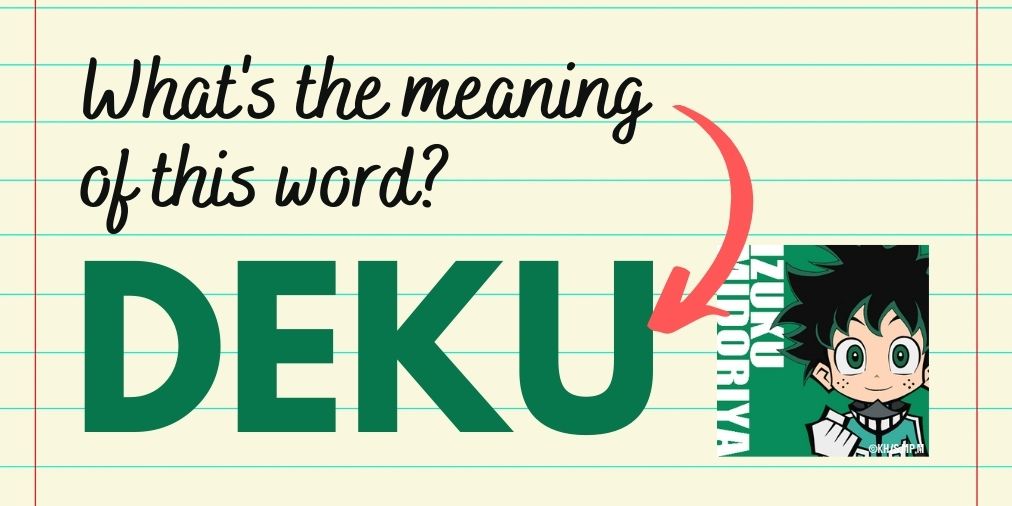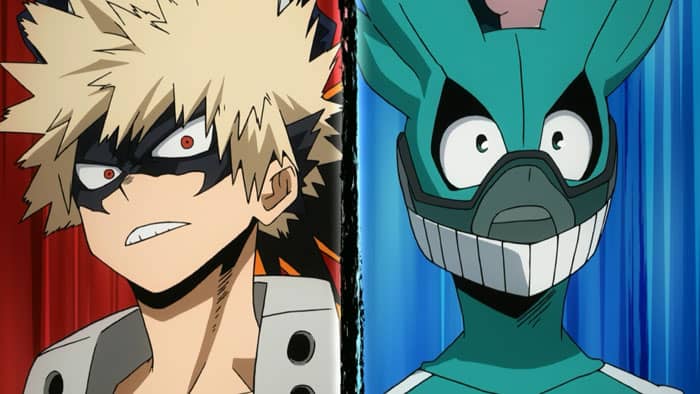
What does "Deku" actually mean?
In this essay, we will look into the Japanese word Deku. This will take us through some fascinating traditional Japanese culture as well as modern use of this old word.
We'll take a tour through samurai-era puppets, Zelda games from the 1990s, and the current anime phenomenon Boku no Hero Academia, a.k.a. "My Hero Academia." Let us begin with a broad explanation of the meaning of Deku.
1. What does the Japanese word “Deku” mean?
The Japanese word Deku, or “木偶” in Kanji, means “puppet,” according to Linguaholic. According to JLearn, this is related to the word Dekunobou, or “木偶の坊 (でくのぼう)” which meaning “wooden doll.” These definitions are for old wooden puppets. The 木 character signifies "wooden" or "tree," and the 偶 character has a variety of connotations. It could indicate "even number," "accidentally," "same kind," or "man and wife." One possible derivation for this phrase is the Japanese word Deiguu, which means "clay doll."
While the basic meanings of Deku and Dekunobou are physical puppets and wooden toys, both can be used as insults. They are both used to denote a jerk, a moron, or someone who is useless. Because traditional Deku dolls lack arms and legs, calling someone a Deku is akin to stating they are as useless as a limbless wooden doll.
While this description may appear severe, it is a mild insult, similar to calling someone an idiot or a blockhead in English. Deku is a kind of shorthand for Dekunobou.

2. Where can you find the word “Deku” in popular culture?
The term Deku originally appeared in popular culture in The Legend of Zelda video game series. In Majora's Mask, the main character becomes a living Deku doll. The game's dols have limbs and feet, like traditional Japanese puppets. Legend of Zelda: Deku Characters
Famously shown in Boku no Hero Academia manga and anime (My Hero Academia in English.) Fandom calls the main character in My Hero Academia Izuku Midoriya. His surname means “green valley” in English, with 緑 (Midori) translating to green and 谷 (Tani / ya) translating to the valley. He goes by Deku. According to fandom, he was born “Quirkless” but eventually gained a quirk from All Might, granting him One For All. He succeeds history's greatest hero. His biggest expertise is his understanding of hero tactics. It shows that he is well-educated and can apply it.
While this may appear to be a harsh moniker, it has two meanings. One insultingly means “useless” or “worthless.” However, Deku sounds like Dekiru, which means “can do.” That is, it depends on who is speaking to Izuku. This is a Japanese lettering pun on his name.
The Japanese word Dekiru means “to be able to” and is written as. The stem and infinitive of the verb are Deki. Dekiru means “can do” in the present simple positive form. Formally, “can-do” is “Dekimasu.” The formal negative present form of the verb is “Dekimasen.”
The name Deku was chosen by Midoriya for its dual meaning: it used to make him sad but now makes him glad. He enjoys having a name for it.
Deku is “shipped” with numerous other characters in the anime, according to Fandom. They are Katsuki Bakugou, Kirishima Eijirou, and Shoto Todoroki. Fans imagine two characters in a relationship, hence the term “shipping.” In online forums, fans can explore characters' relationships and write FanFiction about them.

3. Conclusion
Deku is a Japanese word that generally refers to a wooden doll or puppet. Dolls without limbs and legs were common in the past. To call someone, a Deku is a mocking term in Japanese. The expression means that the person is as useless as a wooden doll with no legs or arms. In Boku no Hero Academia, the name Deku is either a pun or means "can-do guy," or means "can't do guy."
SHARE
Leave a comment
Related post
SUBSCRIBE & GET FREE SHIPPING
Get a FREE shipping code when you subscribe.
POLICIES
SUPPORT
INFORMATIONS
Fair Use Statement
Our anime-inspired products are original fan-made designs by LittleOwh, not official merchandise. All anime characters and series remain property of their respective copyright holders. Created with love for the anime community.





0 comment
Be the first to comment